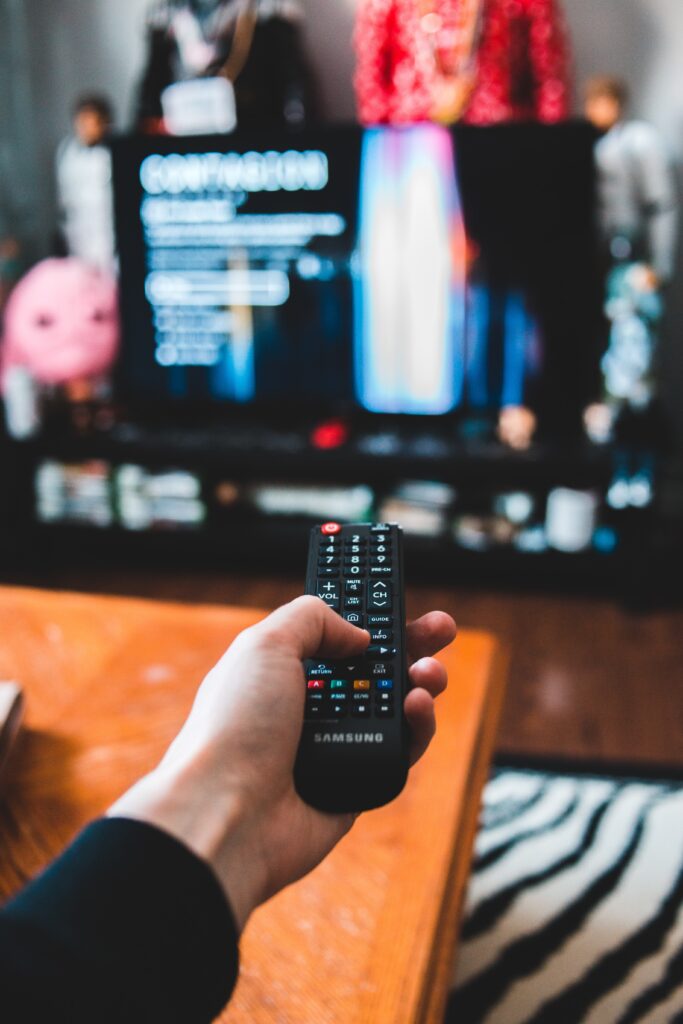
If you’re anything like me, then you probably watch your fair share of TV. And that’s not necessarily a bad thing. I think there is a place for TV. Whether it’s what you watch or watching in moderation. One of the main reasons I find myself in front of the TV is the need to unwind. And yes, whilst I acknowledge that other more mindful activities may have a better impact on my mental health. Sometimes I need to switch from the mindful to the mindless. And this is where TV can play it’s role.
Likewise, TV can be a social activity and I enjoy watching films with friends. Especially since Covid-19 has made the cinema somewhere I’m less keen to frequent. But it’s not just the act of watching together which can be social. TV can create a shared interest and has helped me find common ground. It’s perhaps not the sturdiest foundation on which to build a relationship. But it can be a helpful building block or conversation starter. So, for me at least, TV has it’s good parts. But the more I watch, the more I’m aware of the pitfalls too.
For How to Balance What I Want & What’s Good For Me read here.
The Possible Pitfalls
Now, I know what you’re thinking. Or maybe I don’t. But TV is often a cautionary tale about too much screen time and the impact it can have on our mental health. Mainly, it gets in the way of a good night’s sleep. Either because we’re too busy watching and therefore postpone bedtime. Or using our screens too close to bedtime. And it encourages a couch potato culture where we sit too much and don’t move enough. Additionally, it can stop us engaging in other more helpful habits for our wellbeing. Such as socializing, getting outside or creative pursuits. But, you know all this and I’m not one for jumping on the bandwagon.
For The Sleep Tip that is Like Marmite read here.
TV & Unrealistic Expectations
Instead, my thoughts on TV and mental health surround the unrealistic expectations that TV and the lives we see portrayed there can create. Have you ever noticed how people seem to be able to simply walk into their homes without using keys? Unless they’re creating a moment for a kiss; in which case they appear to have remembered to lock their doors. Or that people rarely seem to need to go to the toilet. Unless it’s some kind of revenge plot or comedic bathroom seen. You know the ones. Well, obviously there’s a reason for this. It’s not good TV and none of want to sit and watch people go through the minutiae of our lives that we have to live every day. We watch TV to escape our lives. Not to watch them on screen.
It’s the Little Things on TV
But whilst those unrealistic elements are understandable. There are other areas which could be more realistic without losing the entertainment factor. For example, it’s rare for a character to wear an outfit more than once. This might seem like a minor thing. But in a world where we are so often judged by what we look like. It holds many of us to a higher standard than we can reach. Leaving us to spend more than we can afford. Or worry needlessly about our appearance. And sometimes both.

Then there is the close knit friendship groups who often live together in property that there is no way they could afford in reality. Whilst some of us do have best friends or a small group of close friends. Many of us are far more likely to have a more diverse, and therefore likely larger, group of friends. But may feel they miss out on this closeness we see portrayed on TV. Leaving us to wonder what we may be missing out on. Are we not good enough, funny enough, nice enough, sociable enough to have such a tight knit group? When in reality this is more likely to be the exception not the rule.
For Why Support Can Come from Unexpected Places read here.
Lastly, in the world of TV everything either works out or ends in tragedy. And whilst I hope we are all fortunate to avoid the tragedies. Everything working out all the time isn’t realistic. There will usually be an episode with a break up, redundancy or money worries. And the character or characters will worry and attempt to resolve the issue. Yes, it may make good TV. But unless it’s a season arc, the storyline is often forgotten in future episodes. Assuming the character has moved on from their relationship, got a new job or resolved their money problems almost immediately. Whilst we know logically that this is unrealistic. I wonder if it still makes us feel that our recovery period is too long or that we’re not bouncing back quick enough from adversity.
Defining Success
TV also shines a light on success filling our screens with role models or success stories which can be impossible to attain. Often characters live in property that they can’t afford. Or have fast-tracked careers which seem unlikely at best. And spend lavishly on clothes, cars and other status symbols which don’t match their pay check. For example, there’s often a female writer working as a journalist in a big city and living alone or with a room mate. With journalism being highly competitive and property prices being what they are. This lifestyle which may be pitched to us as aspirational is actually unattainable. And I can’t help but wonder what is the impact of our mental health when we work as hard as we do for something so elusive?
For What You Need to Know to Increase Productivity read here.
I suppose many may argue my previous point. TV is meant to be fun and energizing. We watch it to forget and enjoy. Rather than to see the struggles some of us face in life writ large. And, if we do want to watch something a bit more gritty there’s a ton of TV to choose from.
But, would it hurt for TV to be that much more realistic? Could it be a comfort to us seeing that our experiences are normal? That it’s okay to hurt and to take your time to grieve? Or that family’s, friends and relationships come in a variety of shapes and sizes? And that sometimes we work hard and don’t always succeed in our chosen field or are able to live where we’d like or how we’d imagined? What would a world with more realistic TV look like I wonder? And would it be better for our mental health? Or deprive us of the escapism we so often turn to the screen for?
What are your thoughts on TV and mental health? I’d love to hear the good, the bad and the ugly? Would we benefit from more realism or should TV be more fantastical to help us escape? As always, let me know below!

I think if a TV show is meant to depict real life, then it needs to do that 100% — and not be a highly styled version of ‘real’; it should be gritty and less glossy because those types of shows often have a purpose beyond just being entertaining (Dopesick comes to mind). Dramas that are about life but are rooted in being an entertainment show should be more fictional and edited BUT we need to make sure we don’t get caught up in the unattainable aspects of life they often present. Total escapism through watching fantasy, sci-fi or horror is great to get into as it’s not meant to be based on normal life — which is why it works as pure entertainment. This was really interesting to read — got me thinking!
Really interesting post and concept – we watch TV shows that we can resonate with and that give us a dose of real life but we also strive for fantasy and far-fetched shows to take us AWAY from reality. Sometimes you need the escapism because the reality of some shows (talking about soaps and things like the brilliant Afterlife on Netflix) can be a little close to home. Great idea for a post.